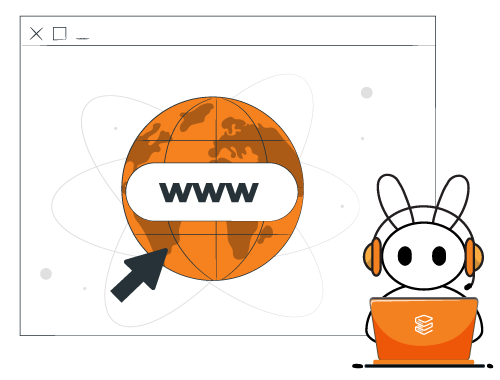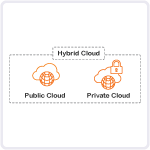Businesses are increasingly shifting to cloud infrastructure. They are doing so to drive innovation, enhance scalability, and improve operational efficiency. But, managing a cloud infrastructure can get complicated and requires expertise. It also needs specialized skills, constant monitoring, and timely updates. That’s where managed cloud services help. Managed cloud service providers offer a comprehensive solution to businesses seeking cloud infrastructure. That too without the burden of day-to-day management. In this blog, we will take a look at the features and benefits of managed cloud services. Also explore how they can empower organizations to thrive in the digital age.
Table of Contents
Understanding Managed Cloud Services
Managed cloud services refer to the outsourcing of various cloud-related tasks and responsibilities to a third-party service provider. These services go beyond the basic infrastructure provided by cloud providers. They offer a holistic approach to managing, optimizing, and securing cloud environments. Managed cloud service providers (MCSPs) take charge of tasks. These tasks include architecture design, deployment, monitoring, maintenance, security, and more. They allow businesses to focus on their core activities, rather than getting bogged down by the complexities of cloud management.
Features of Managed Cloud Services
1. 24/7 Monitoring and Support:
Managed cloud services provide continuous monitoring of your cloud infrastructure. This method makes sure that any potential problems are found and resolved. It should be done before they escalate, minimizing downtime and ensuring optimal performance. Dedicated support teams are available around the clock to address concerns. They also troubleshoot problems and provide timely help.
2. Automated Scalability
Scalability is one of the primary advantages of cloud technology. Managed cloud services use automation tools. These tools scale resources up or down based on demand. This ensures that your applications and services can handle fluctuations in traffic without manual intervention.
3. Performance Optimization
MCSPs analyze your cloud environment’s performance metrics and make adjustments to enhance efficiency. They optimize resource allocation, streamline workflows, and implement best practices. It ensures that your applications run smoothly and deliver optimal user experiences.
4. Security and Compliance
Security is a major risk for cloud-based enterprises. Managed cloud services incorporate robust security measures. These measures include intrusion detection, data encryption, access controls, and regular security audits. MCSPs also stay updated with the latest compliance requirements. It ensures that your cloud infrastructure adheres to industry standards and regulations.
5. Backup and Disaster Recovery
Managed cloud services provide automated data backups and disaster recovery solutions. This guarantees that your critical data is safeguarded and can be quickly restored in the event of data loss or system failures.
6. Cost Management
If cloud expenses are not carefully controlled, they may quickly spiral out of hand. MCSPs track resource usage and provide insights into cloud cost optimization opportunities. They help you select the right pricing models, allocate resources efficiently, and remove unnecessary expenditures.
7. Expertise and Consultation
Managed cloud service providers have experienced cloud professionals. These professionals understand various cloud platforms, architectures, and technologies. They offer strategic guidance and consultation. It helps you to make informed decisions that align with your business goals.
Benefits of Managed Cloud Services
1. Focus on Core Competencies
By outsourcing cloud management tasks, businesses can allocate more time and resources to their core competencies and strategic initiatives. This enables greater innovation and differentiation in the marketplace.
2. Reduced IT Burden
Managing a cloud infrastructure needs specialized skills that may not be readily available in-house. Managed cloud services alleviate the burden on your IT team. It allows them to concentrate on tasks that directly impact your business growth.
3. Enhanced Reliability
With continuous monitoring, proactive maintenance, and automated failover mechanisms, managed cloud services enhance the reliability and availability of your applications and services. This translates to improved customer satisfaction and reduced downtime.
4. Cost Savings
While there’s a cost associated with engaging managed cloud services, it often proves to be cost-effective in the long run. By optimizing resource usage, avoiding downtime, and leveraging the expertise of MCSPs, businesses can achieve significant cost savings.
5. Rapid Deployment
Managed cloud service providers have the expertise to design and deploy cloud environments quickly and efficiently. This accelerates your time-to-market for new products and services.
6. Security and Compliance Assurance
Security breaches can have severe repercussions. Managed cloud services offer robust security measures and ensure compliance with industry standards, giving you peace of mind and safeguarding your sensitive data.
7. Resource Optimization
MCSPs are able to help you in figuring out which services are going to be most helpful for your workload. They can also help you figure out which price models are best for your needs and how to set up services to get the most out of them while keeping costs down.
8. Automatic upgrades
It’s important for businesses to continuously update and improve their networks to keep up with the rapid pace at which cloud technology is evolving. When it comes to keeping their networks up-to-date, businesses that use managed cloud service providers don’t have to be concerned about the inconvenience.
Why choose SupportFly as your managed cloud service provider?
At SupportFly, we specialize in transforming the way businesses use the cloud. Our team of cloud experts takes the reins of your cloud infrastructure, providing 24/7 monitoring, optimization, and maintenance. We make sure you sleep tight without worrying about downtime or security breaches. We’ve got your back, ensuring that your cloud environment always operates.
We:
- Have a security first approach: Security is important to all we do. Our state-of-the-art security measures, including data encryption, intrusion detection, and compliance management, ensure that your sensitive information is protected from any threats. With SupportFly as your managed cloud service provider, you can confidently focus on innovation while we safeguard your data.
- Want you to scale without limits: As your business grows, so do your demands. With SupportFly’s automated scalability solutions, your cloud resources effortlessly adjust to accommodate fluctuations in traffic and workload. Our commitment to flexibility ensures that your business can evolve without any constraints, while we take care of the scaling complexities.
- Will maximize uptime, reduce downtime: Downtime is a thing of the past when you choose SupportFly. Our continuous monitoring and proactive approach mean that we identify and resolve issues before they impact your operations. Experience maximum uptime and reliability, allowing you to serve your customers without interruption.
- Offer complete server management services: In addition to our robust cloud services, SupportFly offers complete server management. Our experts handle everything from setup and configuration to continuous optimization. Focus on your core business while we ensure that your servers run efficiently and securely.
- Let you drive innovation and leave the rest to us: With SupportFly as your managed cloud services provider, you gain the freedom to innovate and expand your business horizons. Our team of seasoned professionals brings a wealth of knowledge, keeping you updated on the latest cloud technologies and trends, so you can make informed decisions for your business’s future.
- Are trusted by businesses worldwide: We follow a customer first approach. We want to offer maximum value to our customers. We have gained trust globally by delivering services to our clients. We’ve helped startups, enterprises, and everything in between streamline their cloud operations, cut costs, and boost performance.
Ready to take your business to the cloud with confidence? Contact us today to get started and take your business to new heights!
FAQs
Q1. What is a managed cloud?
A managed cloud service is a type of service offered to businesses or individuals having cloud infrastructure. The service includes the management, maintenance, and support of the related cloud resources by different cloud providers.
Q2. What is an example of a cloud managed service?
AWS cloud is a great example of a managed cloud service. Others include Google cloud, Azure cloud, Vultr cloud, etc.
Q3. What does a cloud management service provider do?
A cloud management service provider offers a range of services to help businesses in managing their cloud infrastructure. This includes monitoring performance, optimizing resource usage, implementing security measures, ensuring compliance, and providing expert guidance.
Q4. How does cloud management enhance security?
Cloud management enhances security by implementing various measures such as encryption, access controls, and intrusion detection. It monitors for unusual activity, identifies vulnerabilities, and ensures compliance with security standards, reducing the risk of data breaches.
Q5. What are the benefits of automated scaling in cloud management?
Automated scaling in cloud management allows resources to adjust dynamically based on demand. This helps businesses handle traffic spikes without manual intervention, ensuring consistent performance, cost savings, and improved user experiences.
Q6. How does cloud management control costs?
Cloud management controls costs through resource optimization, monitoring for unused or idle resources, and recommending rightsizing of instances. It also helps choose appropriate pricing models and removes unnecessary expenditures.
Q7. Can cloud management help with compliance?
Yes, cloud management plays a crucial role in maintaining compliance with industry regulations. Managed service providers ensure that the cloud environment adheres to necessary compliance standards, protecting sensitive data and avoiding legal issues.
Q8. What is the role of monitoring in cloud management?
Monitoring in cloud management involves tracking the performance, availability, and health of cloud resources. It enables quick identification of issues, proactive problem-solving, and the maintenance of high levels of uptime and reliability.
Q9. How does cloud management contribute to business agility?
Cloud management enables businesses to adapt quickly to changing demands. With automated processes, businesses can scale resources, deploy new services, and pivot strategies swiftly, improving their overall agility and competitiveness.
Q10. What is the difference between cloud management and cloud governance?
Cloud management focuses on the day-to-day operational tasks of maintaining and optimizing cloud resources. Cloud governance, on the other hand, involves setting policies, guidelines, and best practices to ensure that cloud operations align with business goals and regulatory requirements.
Q11. What are the 4 types of cloud computing?
According to Google: public cloud, private cloud, and mixed cloud are the three main types of cloud computing. There are four major services within these deployment models: infrastructure as a service (IaaS), platform as a service (PaaS), software as a service (SaaS), and serverless computing (SaaC).






































































